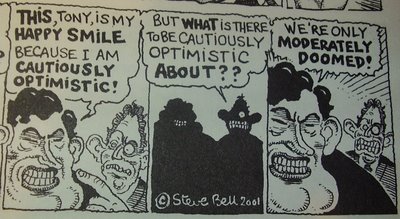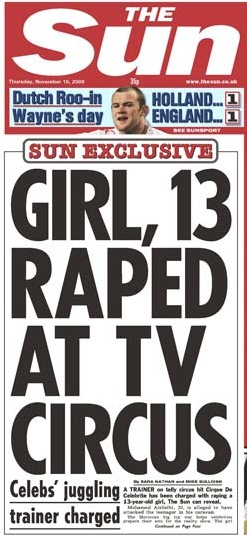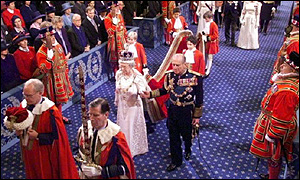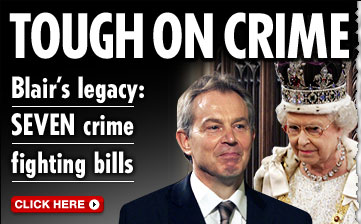 The sky sure is dark with that visor.
The sky sure is dark with that visor.
The incessant shrieking for 90 days continues. Britain currently seems to be stuck in an outbreak of deja-vu; we're at war in Iraq, again. We're at war in Afghanistan, again. According to the NME, we're being blessed with new-rave. And finally, only a year after 90 days detention without trial was emphatically rejected by the House of Commons, "Sir" Ian Blair wants it to be introduced again. Accompanying him was the previous speech by the head of MI5, and Gordon Brown's sycophantic "complete agreement" with the Sun's favourite anti-terror policy. Those lining up to support further detention without charge resemble a bunch of cheerleaders, each wanting to be the cute, blonde one in the centre that gets all the attention, except in this case it's which one can be the "toughest". David Cameron is naturally the slightly dumpy girl that's just there to make up the numbers, being soft in the cheerleader terror stakes.
As well as giving his speech, Ian Blair has been appointed with selling 90 days to both the public and those nay-saying politicians. John "Dr Demento" Reid, perhaps knowing that the case is, as David Davis has stated, dreadful, appears to be ducking the fallout this time. That Ian Blair may be shortly out of a job, as the IPCC report on his role in the aftermath of the shooting of Jean Charles de Menezes must be nearing completion, only serves to magnify the ridiculousness of this situation. Blair is not just a berk closely associated with this government and in particular this prime minister, he's the head of an organisation that enforces the laws of the land. He and his colleagues are not meant to be making them up as well. This doesn't mean that he shouldn't be advising ministers and the government on what might help; he should just be doing it in private, rather than in public. His speech to the Urban Age summit in Berlin is mostly the tedious talk from a top cop you'd expect at such an event, but the main basis for it was undoubtedly to get his own views on terrorists, terrorism and the laws involving them out. The more interesting bits are summarised below, and he doesn't get off to a great start: and now you may have seen this week the full horror of what Dhiren Barot was planning: a dirty bomb, for which he was sentenced to a minimum of 40 years imprisonment.
Oh yes, that plan to set smoke alarms on fire. Horrifying, quite. Al Qaeda poses a global threat of mass casualty terrorism, without warning, without negotiating position, with constantly evolving tactics. They are active. This summer, Al Qaeda appears to have been directly involved, from the Indian sub-continent, in the alleged plot to blow up airlines, flying out of the United Kingdom to the United States.
Months before they're going to get to court then (which Blair covers later), we have the Metropolitan police commissioner saying that the "liquid explosives" plot was an al-Qaida operation. I'm sure this won't affect their trial in any way. The people we are watching have compatriots here in Germany and in dozens of countries round the world. The sky is dark.
No, that's just your headgear being on too tight. The heavens it seems are teeming with so many suicide operatives that they're blacking out the sun. Looks like we really are in the shit. Thirdly, there is a war of ideas going on, certainly in Britain. Again, Gambetta is interesting here. He has analysed suicide bombing in Iraq and has pointed out some early conclusions about bombings in Britain.
So these were thirteen. I can now tell you that there are nearly 100 people, either on or awaiting trial in the United Kingdom on terrorist related offences, including five of these thirteen. Of those, a significant majority are either British born or have spent most of their lives in Britain. Dhiren Barot came to Britain as a small child born to a Hindu family. He was educated in Britain and converted to Islam in Britain.
Gambetta's analysis and Blair's extrapolating from it are lengthy and too long to be dealt with in this post. Blair though, unlike Gambetta, seems to have decided to take his preliminary findings on a small sample, and then apply them to the 100 who have not yet been convicted of any crime. This is the sort of comment he ought to refrain from making until they have at least been tried. The most concerning issue is support - in principle at least - for terrorist action. Three recent polls - one of Muslim students and two of Muslims generally - have suggested that four, six and two per cent respectively of those surveyed believed the July bombings to be justified. These figures extrapolate into 80,000, 120,000, and 40,000 people holding this opinion. I am not suggesting this means that there are this many terrorists. We should remember, for instance, that a 1971 poll showed significant tacit support for the Baader-Meinhoff group among young people in West Germany, which never translated into active support. It does, however, indicate the power of the ideology involved.
Or it could suggest that the opinion poll had leading, distorted questions. The opinion polls could be based on too small a sample for them to represent Muslim opinion as a whole. Or they just could be complete bollocks. Let's not beat around the bush. If the opinion polls had been right, Labour has been in the lead in vast majority of polls from 1987 until around this year. That didn't stop the Tories winning in 87 and 92. In order to overcome this view of the world, I therefore absolutely back the United Kingdom Government's intent to build a clear narrative of "Britishness", based on values of tolerance, fairness, inclusivity and respect for the traditions and the faiths of others. This may well be, in fact, a statement adaptable to a Europe wide position.
Oh good, nice to have you on board Ian. The only problem with this is that, as Unity points out, none of the things suggested so far have actually been uniquely British, just what are now considered British values. It's far too easy to make light of British values - judging by today's tabloid hoorays for the possibility of being able to buy unlimited amounts of booze without having to pay duty, thanks to an expected European Court of Justice ruling, you'd think that all we do is drink. Take away habeas corpus, no problem. Dispense with cheap alcohol, and you've got a fight on your hands. Dr Demento's current "script" for what Britishness is, is perhaps typically British: it's two parts hot to two parts cold, a lot like the weather. He suggests that "respect for the law", "freedom of speech", "equality of opportunity" and "taking responsibility for others" should be what unites us. That Britain as a nation, despite never having a wholesale revolution in the true sense, has time and again risen up against the "law" as New Labour would like us to regard it, doesn't seem to be worth considering. Some in New Labour would also like freedom of speech to be curtailed in order for freedom itself to be maintained, a contradiction against our own supposed values if ever there was one. Nonetheless, they [terrorists] are criminals and we should call them criminals and not dignify them with the name of soldiers, which Sadique Khan and others claim to be. They are not. They are murderers: murderers and those that help in murder by planning, by supply, by encouragement and by financing (usually through fraud).
At last, a decent point. He's not quite completely mad, see? The risk of what these people are planning is so horrific that the police have to move in early, with the result that arrests provide huge amounts of information but not necessarily immediately available evidence. In just one recent case, the Met arrested a small number of people for terrorism offence, and seized evidence that appeared to represent 100,000 identities. At the time of these arrests, computers, hard drives and other data storage media were seized, which together amounted to three terabytes of data, much of which was encrypted. To put this into visual perspective, one terabyte can be described as 50,000 trees made into paper and then printed. Ten terabytes represents the contents of the US Library of Congress. It takes time to examine and to assess the nature of the evidence found and determine the varying degrees of culpability of those arrested.
I'm not a policeman, but I would have thought it would be a good idea to perhaps concentrate on the encrypted stuff first. Makes sense, right? As for a small number, Blair seems to be referring to the alleged "liquid bombs" plot again. 24 people were arrested, not exactly a small number. All this data being used as a justification though is nonsense: the police are just picking up every single thing that might conceivably have information helpful to them on it. A good amount of it is going to be superfluous, and obviously so once they actually come to examine it. The argument is false, and being used to blind the average layman with terms they most likely aren't familiar with. A gigabyte maybe, but a terabyte? For other serious crimes, British police can but rarely do hold suspects for up to four days. After long and very heated parliamentary debates, that has currently been changed in Britain to 28 days in terrorist cases. Of course, whether it is 28, 4 or 1, suspects have access to full legal advice in custody. In the recent alleged airline plot, we needed all the 28 days in respect of some of the 24 suspects: if there had been more people, we would probably have run out of time. I believe that an extension to the 28 days time for detention will have to be examined again in the near future.
What Blair doesn't mention is that after holding two of those 24 for 28 days, they released them without charge. This inevitably didn't draw much media attention. As for having full legal advice in custody, the suspicion has to be that the longer the police have to continually question a suspect, even with the presence of a lawyer, they can be worn down. In the case that Blair brings up, one of the suspects alleged he was being repeatedly strip searched without reason. Others said they hadn't been interviewed by the police for the whole first week. Surely it isn't beyond the police to question and gather evidence they've seized at the same time? To arrest in the first place they need to have strong suspicions, and you'd have to imagine, intelligence. Why this isn't presented to them sooner is a question the police should have to answer. 28 days should be more than adequate for any investigation: it seems the police need more resources rather than actually time, in which case they should ask the government for more funding, officers and specialists. Blair's current case appears to be based purely on the failings of the police rather than the system itself. Secondly, I am certain that we should introduce a procedure to question suspects after they have been charged with a terrorist offence, when new evidence emerges about that offence. This is currently not possible in Britain, except under very restricted circumstances.
I don't see why there should be any problem here. Thirdly, I believe that the ban in Britain on the use as evidence in court of material obtained from telephone intercepts is simply not sustainable in the long term. Because of the very adversarial nature of British courtroom practice, there are difficulties here but they cannot be insuperable. In due course, we will have to seek different legal provisions to ensure that the best evidence becomes available.
Indeed. That the government hasn't already introduced wiretap intercepts as admissible evidence is a scandal in itself; that the security services are either so incompetent or just plain lazy to cover their tracks sufficiently, if their argument isn't just the smokescreen which it most likely is, shouldn't have held up such a "no-brainer." Fourthly, we have benefited from new legislation about receiving and giving training in terrorist techniques and the glorification of terrorism. We must constantly keep legislation under review. For instance, I believe that we will have to consider anew some of our laws about some forms of public protest, including a ban on the burning of flags or effigies and the covering of faces in any demonstration whatsoever.
No, no and no, as expanded upon here. Lastly, our own criminal justice system is creaking under the impact of these trials. One major conspiracy will have taken two years and eight months to reach its court date, if it starts then: a current trial is likely to last over twelve months. The contrast with the speed with which the Netherlands dealt with the murderer of Theo van Gogh is striking.
That's not exactly comparing like with like, is it? The actions of one man with an agenda, with an easily solvable case seeing as he was seen killing van Gogh and was captured shortly afterwards, as opposed to a plot which never met fruition and involves multiple men could not be more striking. British contempt of court laws need to be changed: many terrorist trials are considered to be linked and the courts are reluctant to allow details of convictions in one trial to be published for fear of prejudicing others.
As opposed to the current police agenda, which is to leak any and all incriminating information to the media as and when they can. That Blair himself has already potentially tainted a trial by referring to it as al-Qaida backed when there has been no evidence presented to substantiate it makes his argument rather hypocritical. This prevents the public - including communities from which the suspects come - from seeing justice done and we must trust juries more, in the broad public interest. The fact that we have now heard details of Barot's intentions only arose through media organisations taking judicial action to prize the information out of a reluctant court system.
This is nonsense. The details of his conviction would have come out after he was sentenced anyway. We instead got the information a couple of weeks earlier than we would have done, and now the most titillating or horrifying, but not fully explained parts of it are already being used, by, err, certain figures in their speeches.
The rest is pretty much Blair crowing about how wonderful his force is doing. His agenda though comes across loud and clear - the police need more powers, oh, and he supports the government's Britishness study.
It's then very apt that on the same day that terror debate is reignited with the debates of last year, that the Joseph Rowntree Reform Trust reports with its findings in a report titled, with Blair's breezy bullshit of last year in mind, the Rules of the Game. The report, worth reading in full, summarises while destroying numerous sacred cows in its wake: Our basic conclusion is that the key to successfully combating terrorism lies in winning the trust and cooperation of the Muslim communities in the UK. However, the government’s counter terrorism legislation and rhetorical stance are between them creating serious losses in human rights and criminal justice protections; loosening the fabric of justice and civil liberties in the UK; and harming community relations and multiculturalism. Moreover, they are having a disproportionate effect on the Muslim communities in the UK and so are prejudicing the ability of the government and security forces to gain the very trust and cooperation from individuals in those communities that they require to combat terrorism. The impact of the legislation and its implementation has been self-defeating as well as harmful. Its boomerang effect is being made more damaging by government statements, in particular those of the Home Secretary, John Reid.
and: We also recognise that the government has to reassure the public that it is acting firmly to protect them. But the combination of tough laws and tough talk ministers have adopted is divisive and directed too much at the majority population. There is a strong suspicion that some pronouncements are inspired by electoral considerations.
The whole of the current debate seems centred, as already mentioned, on who's tough and who isn't. Labour has turned terror into a party political issue, which is completely unacceptable, and dangerous. David Davis doesn't escape from criticism either: Ministers (and some opposition spokespersons) publicly demand too much from Muslim community leaders who are not representative enough to deliver in any case. The emphasis on ‘separateness’, and in some quarters ‘apartheid’, inspired in part by Jack Straw’s comments on the veil, is as damaging as it is misleading, since all the evidence available (which we examine in Chapter 2) suggests that the majority of Britain’s Muslims – by no means an homogenous group – wish to integrate and do not want to live parallel lives in self-chosen ghettos.
More: We strongly urge the government to abandon talk of a ‘War on Terror’. This terminology is misleading and disproportionate and leaves the Prime Minister open to the charge that he is exploiting a politics of fear. It allows terrorists to assume the dignity of being ‘soldiers’ or ‘combatants’ instead of the mere criminals that they are. In responding to the terrorist threat, it is essential to keep a sense of proportion for other dangers for a democracy like Britain lurk in the shadow of terrorism. But the rhetoric of war has encouraged an over-reaction in which human rights and the rule of law are among the more obvious casualties.
Perhaps, with this echoing Ian Blair's thoughts, the government will finally put this into practice. We make a series of recommendations in Chapter 7, the most important of which are that the government should adopt a more open and inclusive counter terrorism strategy in place of its combative insistence that it alone knows the right course; that it should recognise that the participation of local communities, Muslim and non-Muslim, is vital; that the request of the government’s own Muslim working groups for a wide-ranging inquiry on the roots of terrorism should take place; and that the government’s strategy should be constructed and implemented within the framework of the rule of law and human rights, a recommendation with which the intelligence community agrees.
Finally, and possibly most likely to anger the government: We are also convinced that the government should review its foreign policy in the light of British interests at home and abroad. We say so not out of a knee-jerk anti-Americanism but from a profound conviction that the Prime Minister’s close and publicly unquestioning stance alongside the United States is damaging to British influence in the world at large and in Europe; that it feeds extremism and violence at home and abroad; and that it casts severe doubt on this country’s commitment to democracy and human rights which must be the cornerstone of our struggle against extremism.
This passage gives the lie to the new Labour orthodoxy of it being al-Qaida who are being successful at propaganda and the West failing to match their rhetoric. Who needs propaganda from terrorist groups when the Israel-Palestine conflict is on the screen and when hundreds of thousands of Iraqis are dead? The failure of Labour to examine itself and recognise its own actions in the amount of radicalising that is going on is its greatest failing in the so-called war on terror. The Rowntree report provides a solid basis for the government to adapt its policies. That it has no intention to, when it still considers its "toughness" an electoral virtue, just damns it even further.Labels: 90 days, civil liberties, John Reid, sir ian blair, terror, war against bullshit
 It's nice to be blamed for the potential downfall of democracy as we know it every once in a while. There has to be a great deal of irony involved when that blame comes from err, the outgoing chief strategy adviser of the Blair government, aka one of the legion of spin doctors and PR men that Labour has increasingly come to rely on over their 9 years in power, but it still leaves you with a warm, glowing feeling, a little like the point of orgasm before the self-loathing sets in.
It's nice to be blamed for the potential downfall of democracy as we know it every once in a while. There has to be a great deal of irony involved when that blame comes from err, the outgoing chief strategy adviser of the Blair government, aka one of the legion of spin doctors and PR men that Labour has increasingly come to rely on over their 9 years in power, but it still leaves you with a warm, glowing feeling, a little like the point of orgasm before the self-loathing sets in.





